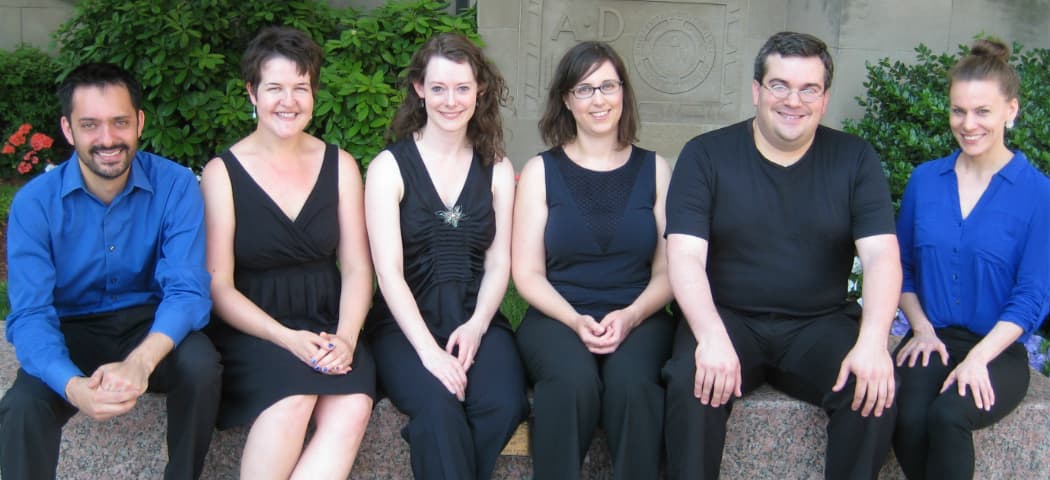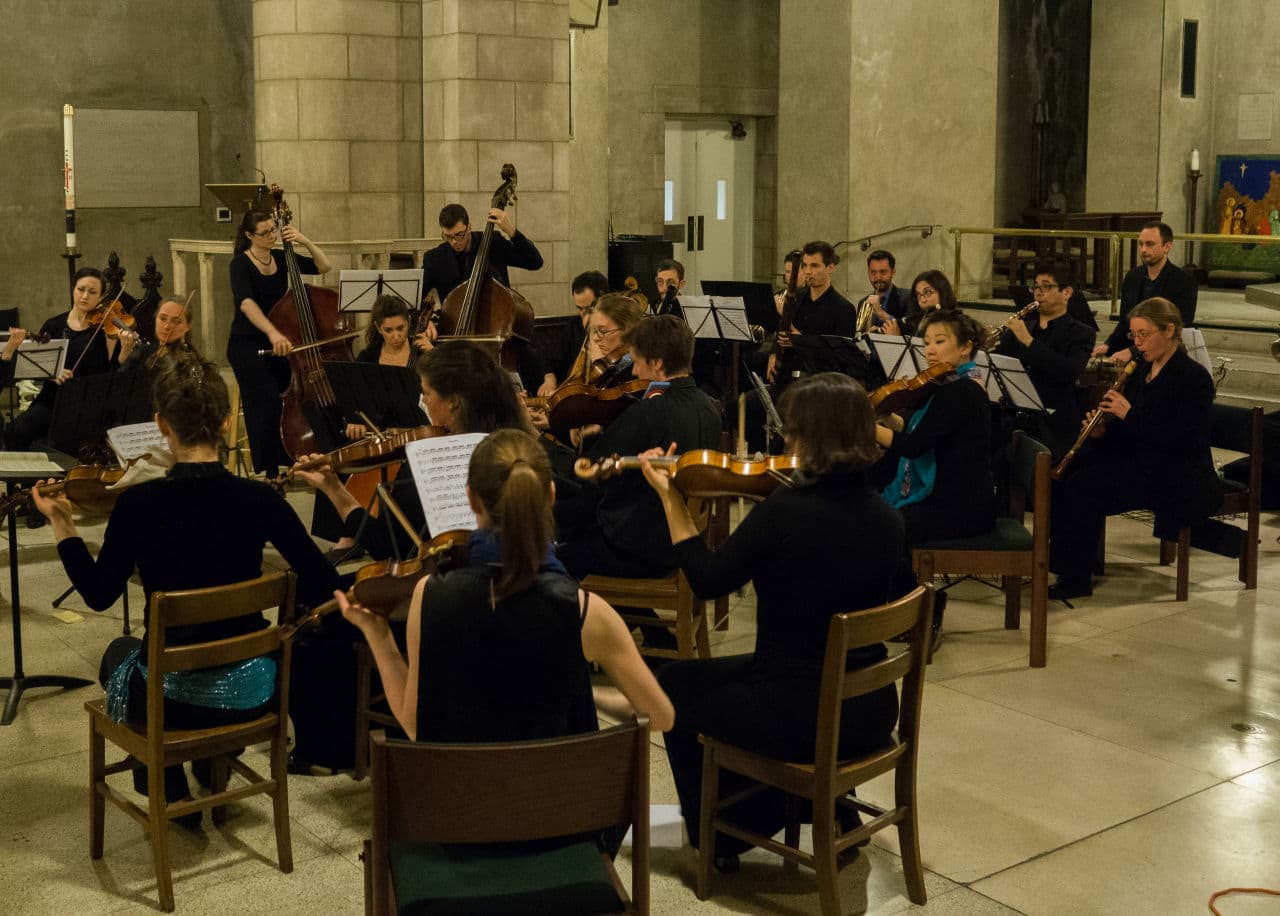Advertisement
Conductor-Less Grand Harmonie Spans The Genres With Mozart To Haydn This Season

The players in Grand Harmonie, the Boston-based wind ensemble dedicated to period instrument performance, have a unique take on leadership.
Take it or leave it.
Performing mainly without a conductor, the ensemble tackles music from a surprising range of musical ages. Period ensembles that play Biber and Vivaldi aren’t that unusual, but groups that bring the same sensibility to Mozart, Beethoven and even Wagner don’t exist anywhere else.
“A wind-centric organization makes such a cool sound,” says horn player Elisabeth Axtell, one of the founding members of Grand Harmonie. “We wanted to play different genres, with different instrument formats, and be more flexible. If we do use a conductor, they come in as partners in our artistic decisions.”
Here's a recent Grand Harmonie performance:
The group, beginning its fourth season, gets its name and its inspiration from the “Harmoniemusik” tradition. As modern orchestras were taking shape in the 18th century, smaller groups of wind players formed as natural offshoots. The concertizing was democratic — ranging from marching band ensembles to wedding performances to opera to orchestral repertory.
Flexibility was the by-word: Harmonie groups performed for dinner parties, operatic interludes and in concert. At certain points in that era, every notable household — talking royalty here — had a Harmonie ensemble.
The original idea of wind players performing regularly disappeared, and largely, so did the concept of complex ensembles playing without a conductor. In recent generations, that notion has begun to change. New York-based Orpheus Chamber Orchestra was perhaps the first group to play without a leader. Boston’s A Far Cry has more recently established itself as a conductor-less string ensemble.
“There’s really no model for us,” Axtell says of a wind group without a conductor. “It’s both terrifying and fantastic. The fact that we are wind-driven is unique — it’s an entirely different concept of traditional orchestral hierarchies, and I think it has an effect on the sound product.”
Of course, someone has to lead. Not in the “big boss waving a stick on the podium” kind of way, but in the subtle way that makes performances cohere: giving an entrance, providing an emphatic outro, gently setting a tempo that everyone can visually connect to and follow.
With string ensembles, that usually falls to the first violin. With a wind ensemble, “the principal oboe can take some of the leadership role,” says another one of the group’s founders, oboist Kristin Olson. “Playing the ‘Gran Partita’ gives me the chance to feel like a concertmaster."

“With or without a conductor, there’s a natural hierarchy,” Olson says. “The principal oboe can take a leadership role — I’m sitting in front of everyone. But really there’s a constant conversation with the eyes. And it varies — there’s no way the oboe is conducting a work by Beethoven, for instance.”
The flexibility of Grand Harmonie comes into evidence with a glance at this season’s concerts. This weekend’s season debut in Cambridge, Mozart’s “Gran Partita,” shows off the group in its core configuration — a dozen wind players, with string bass. A November performance of Mozart’s “Requiem” is a completely different animal: Grand Harmonie collaborates with a quartet of soloists, the Harvard University Choir and conductor Edward Elwyn Jones. Programs in December, and later in February and May, return to chamber settings, with music ranging from Wagner’s “Siegfried Idyll” to French dances to Haydn, Bach and Salieri.
Perhaps the most ambitious extension of the period instrument concept comes in January, when Grand Harmonie collaborates with director Julia Mintzer and conductor Geoffrey Andrew McDonald for performances of Beethoven’s only opera, “Fidelio.” Those performances will be at Princeton University, part of the group’s effort to extend its geographic reach.
“Half of us are from Boston, and half from New York,” Axtell says. “We’ve performed regularly in both cities, and Princeton seemed like a logical next step. We’d like to get to the West Coast, and to the South too."
“As far as we know, we’re the only period ensemble focused on this range of music. And our audience is as flexible as we are,” she says. “We play for the folks who are interested in period music, but the other half of our audience hasn’t really found period music before. We want to welcome people, to try and speak from the stage, tell people how our instruments work, and break down the walls between us.
Those audiences sound like a classical music organization’s dream: a mix not only of aficionados and newcomers, but of old and young as well.
“Our audiences are a melting pot — 20-somethings, 30-somethings, 70-somethings. I think if you are serving something authentic, putting genuine music in front of people, whether it’s in libraries, in concerts, in salon-style events — you always do it in a visceral way, if you want to thrive."
For Axtell and the rest of Grand Harmonie, the challenges of playing the instruments are part of the reward of playing them.
“The music comes alive on these instruments,” Axtell says. “There’s a risk playing period instruments — you’re not going to hear the technically polished performances on a natural horn, as you would on a modern instrument. When we walk onstage, we are never sure whether the instruments are going to work or not."
“But I feel more capable of singing through my natural horn, and this is how the composers wrote this music. Some people may view period instruments as trying to do it just for show, a kind of play acting. For us it’s a chance to make this music real. That drives us.”
Grand Harmonie performs Mozart’s “Gran Partita” Friday, Oct. 16 at St. Peter’s Episcopal Church, 838 Massachusetts Ave, Cambridge, and Saturday, Oct. 17 at Memorial Church, 1 Harvard Yard, Cambridge. Both concerts begin at 7:30 p.m. Visit Grand Harmonie's website for tickets.
Keith Powers, former music critic at the Boston Herald, now freelances for a number of newspapers and magazines. Follow him on Twitter at @PowersKeith.
